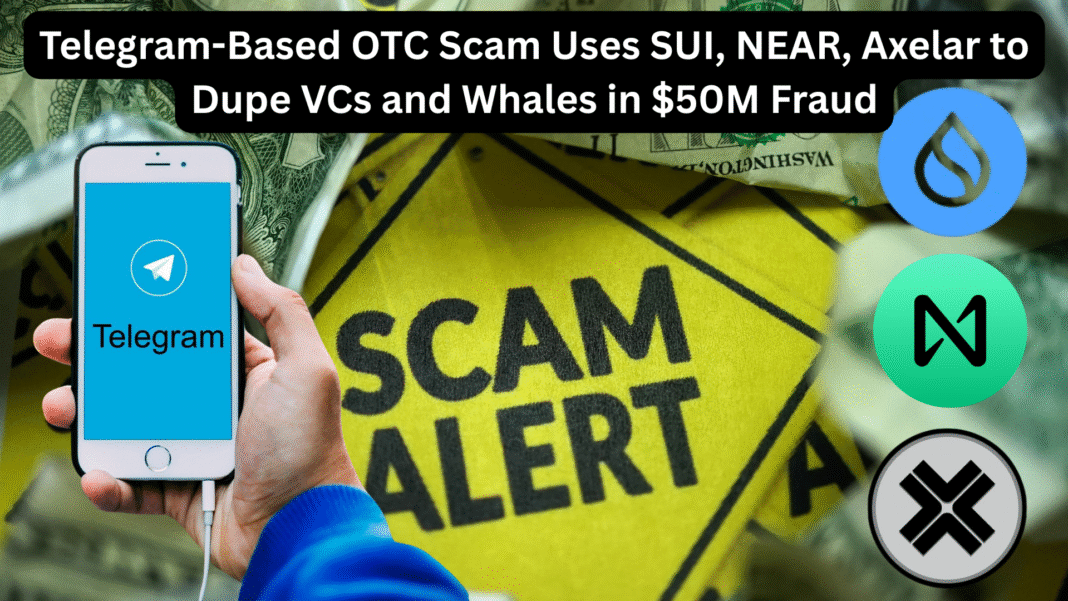A massive over-the-counter (OTC) cryptocurrency scam has come to light, involving popular tokens such as SUI, NEAR, Axelar, SEI, and several others.
Estimated to have stolen over $50 million, the scam was orchestrated over several months via Telegram, a popular messaging app often used for crypto trading and networking.
How Was The Scam Carried Out?
The perpetrators built credibility by initially delivering legitimate tokens to early buyers, successfully gaining the trust of high-profile investors.
Starting in November 2024, several venture capitalists (VCs) groups began offering over-the-counter (OTC) crypto deals via Telegram, featuring top-tier tokens like Aptos, SEI, $GRT, and $SWELL at steep 50% discounts and 4–5 month vesting periods.
These deals seemed legitimate at first—tokens were delivered on time, building immense trust among retail investors, whales, and KOLs. From February 2025, the deals grew larger, adding high-demand tokens like $SUI, $NEAR, and Axelar.
Despite warnings from token teams like SUI and EGLD in May, investors kept buying in.
By June 1, token distributions stopped, and vague excuses followed. On June 19, Aza Ventures revealed the scam: their main dealer, “Source 1,” had been running a Ponzi scheme, using new funds to fulfill old deals.
The scam unraveled when Source 1 vanished, halting all payouts. Estimated losses exceed $50 million, with many investors losing seven figures.
Once enough trust was established and larger sums were at stake, the scheme collapsed into a classic Ponzi structure.
Victims were left with worthless promises and no legal recourse, as the scam exploited the loosely regulated nature of OTC trading and Telegram’s anonymous environment.
Also Read: Largest Telegram Crypto Darknet Huione Sees Increased Activity After Alleged Closure, Report
OTC Scam Sparks Calls for Safer, Regulated Crypto Trading Frameworks
The incident highlights the growing risk associated with peer-to-peer crypto transactions and the urgent need for more secure, regulated OTC frameworks.
It also serves as a cautionary tale for investors, regardless of experience level, to exercise extreme due diligence in informal or high-value crypto deals.
The scam exploited the informal, unregulated nature of OTC trading on Telegram, where there is little oversight or recourse.
It highlights the dangers of trusting unverifiable parties in high-value crypto transactions without third-party protection.
Also Read: Russian Court Holds Telegram Crypto Project Blum Co-Founder Vladimir Smerkis Over Fraud Claims
How To Stay Safe From Such Scams?
Always confirm the counterparty’s legitimacy using reliable sources or mutual relationships to protect yourself from over-the-counter cryptocurrency scams.
Steer clear of big deals with unidentified or unregulated people, especially on Telegram and other anonymous platforms. Make use of trustworthy escrow services or OTC desks that provide transaction transparency and legal protection.
Never get into deals out of pressure or urgency, and always ask for documentation of prior transactions or evidence of finances. Offers that promise special access to cheap tokens or seem too good to be true should be avoided.
Additional security can be provided by smart contract-based escrows, multi-signature wallets, and secure communication.
Above all, do extensive due investigation and put security ahead of ease, particularly when trading cryptocurrency with significant value or peer-to-peer.
Also Read: Telegram Shuts Haowang Guarantee Amid Allegations of Crypto Scams and Cybercrime


